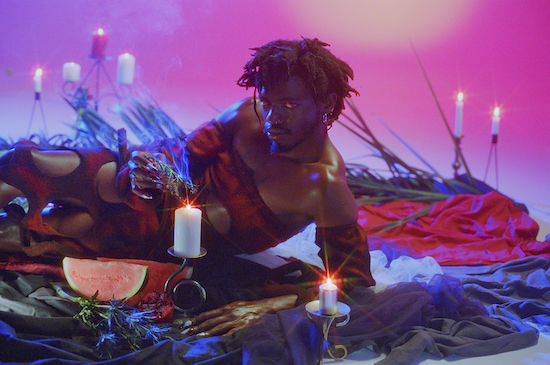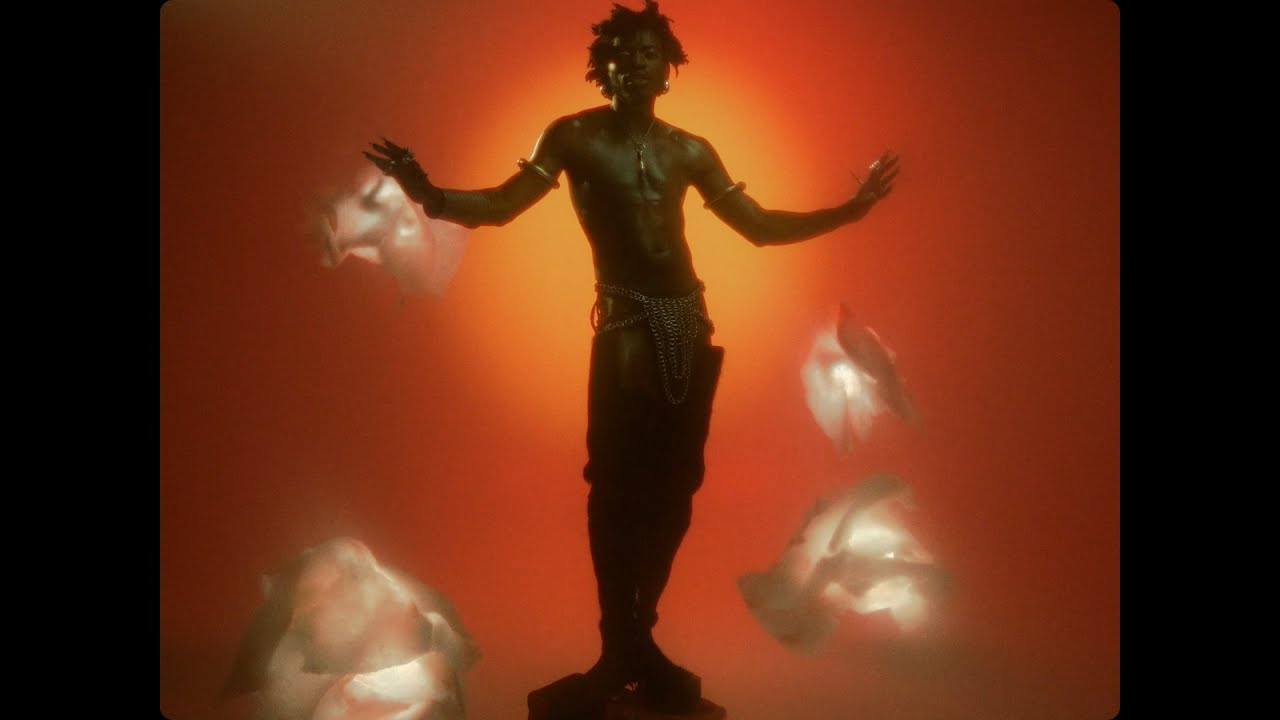Desire Marea’s music is rooted in the present and the past; the earthly and the spiritual realm. It is shaped by the voices of his Zulu ancestors, his calling as a sangoma (traditional healer), and a British military defeat at the hands of a Zulu military made a formidable force by a man, Desire Marea believes, might have been queer. His new EP The Baddies Of Isandlwana brings these influences and energies to the direction of travel set out on 2023 album On The Romance Of Being, a swirling, sensual exploration of spiritual jazz, gospel, erotic chamber pop and the musical traditions of the Nguni people of southern Africa. It feels like a bold consolidation of his identity as a musician, lyricist, and intensely spiritual queer artist.
Desire Marea currently lives in Amandawe, a small township in the area where he spent a childhood and adolescence often ostracised not meeting expectations of masculinity and gender. Despite this complicated history, Desire felt that he needed to return to his rural roots for a period of recuperation and centring after a chaotic decade as half of FAKA, alongside creative partner Fela Gucci. Together, they shook up Johannesburg’s nightlife with their Cunty Power club and quickly became notorious for their collision of performance art, frank and subversive expression of gender fluidity and sexuality, gospel, ballroom and gqom.
Their mission, as they told tQ in 2018, of “the liberation of the black queer body” might have seen FAKA being lauded by the media and praised to the heavens by the likes of Mykki Blanco, but the pressure of working in the hifalutin world of global fashion, art and clubbing took its toll on Desire’s mental health. He eventually decided to take a break "because I felt spiritually I had no place in what we were doing. In FAKA I didn’t always feel like I belonged in those scenes, and in some of the places we were operating in I didn’t feel seen." Even closer to home in Johannesburg he felt "terrible, lonely and quite isolated". Respite was to come by connecting with the ancient spiritual beliefs of his Zulu people.
For a decade alongside his time in FAKA, Desire Marea was working on his debut solo album, a process that began when, as he puts it, "I felt music calling me". He started having vivid dreams in which he was dressed in the regalia of a sangoma, standing among other healers, or in the presence of a teacher. This then fed back into the music-making, and the feeling of a need to "channel certain things" in his voice, or even his posture – some songs were recorded kneeling down "because an entity would only respond that way". The dreams only intensified and became more frequent when solo album Desire was released in 2020.
Desire had dreamed of a particular gobela (a guru or teacher), and ended up going for a reading with her in Soweto. There, he said he found he had the gift of healing, and was put through a series of cleansing rituals "designed to unclog my spiritual portals, in my consciousness and in my body." Further dreams about Desire’s ancestors confirmed his gift, and over a few months he participated in rituals and followed strict regimes to prepare himself physically, mentally and spiritually to undertake the journey to becoming a sangoma healer. Desire says the intense process was the most demanding experience of his life.
This then started feeding into Desire’s work as he set about writing On The Romance Of Being. Music is at the heart of a sangoma’s practice, in which every ritual has a song and involves the beating of a drum – different spirits are summoned by different time signatures. He also followed spiritual guidance in assembling musicians from the South African jazz scene to work with, offering prayers that he might find the right people, and to be connected to their ancestors too. "In African spirituality we believe that everyone has an entourage of ancestors, and I believe that I’ve found musicians who are extremely gifted and come from bloodlines gifted with sound, music, and healing with music”, he explains. “In my prayers I was asking for us to unite in the music, and for the music to carry the soul of that union."
This deep connection with the spirituality of his Zulu identity comes alongside a fascination with the history of the Zulu people. "We are not the most innovative generation, though we sometimes assume that we are because of what technology does,” Desire says, “but the occupations of the human heart, spirit and soul have always happened – my interest in history validates that, and grounds me". This is the context for new Desire Marea EP The Baddies Of Isandlwana, three tracks led by the rich, sumptuous ‘If You Know’, which Desire describes as “orchestral gqom”. The title is inspired by The Battle of Isandlwana, which took place on 22 January 1879, when Zulu King Cetshwayo led an army of 20,000 warriors against a column of 1,800 British and colonial troops. Although they outnumbered the imperialist forces by a considerable margin, the Zulus were armed only with assegai spears and a few ancient guns against the modern rifles, artillery and cavalry of the British. Nevertheless, racial assumptions led to the British underestimating their foe, and during the ensuing engagement, King Cetshwayo defeated the invading force, killing over 1,300 troops, and forcing them to withdraw. His tactics and the formidable fighting prowess of the Zulu were developed from the work of King Shaka Zulu, who ruled in the early nineteenth century.
Desire believes that the victory "speaks to the unity" of the Zulu people inspired by King Shaka Zulu. He describes him as "a very complex man who did a lot of cruel things, but who also united people, who surrendered their names to be one Zulu kingdom for our own longevity, safety and progression as a people. Without that, we would have been like the other colonies, where the native population was wiped out, and because of it we remain a majority in our country rather than how it has been with other colonial states. The battle is a symbol of our resistance, and even though we eventually did lose, it gives us a sense of real pride."
King Shaka Zulu never married or had children, something that was expected of Zulu leaders at the time. Although he isn’t absolutely sold on the idea, and historians certainly aren’t, Desire "enjoys the possibility that this figure who is the pinnacle of Zulu masculinity and a war hero, who united all the kingdoms into one, could have been queer". This feeds into his wider fascination with how sexuality intersects with conflict. "I feel that there is definitely a queerness in war, there is something that gets satiated within masculinity to be in the care of other men, to lick your wounds with other men and to come home to other men in the mountains where you are fighting. I think a lot of men yearn for that, and some who have to go back home to wives and children feel like they need to have a man in their lives." Even if Shaka Zulu himself wasn’t queer, Marea uses the title The Baddies Of Isandlwana as a defiant statement of queerness being a part of Zulu culture throughout its history: "There were queer people there, there were queer people when we formed the tribes, there were queer people when we created all these innovations, there were queer people when we won wars and when we lost them – in each part of history we were there".
Queerness sits at a difficult place in Zulu culture, where to be gay is taboo. Desire says that it is unclear what the attitudes were before colonial times, when Christian missionaries "demonised" LGBT+ sexuality alongside spiritual traditions – as he puts it, "everything that makes us who we are". He adds that a lot of healers are queer, especially bisexual, and also believes that had his ancestors been homophobic, they’d not have chosen him to be a vessel and a healer. He adds that to be chosen to be a healer also has a connection to gender identity. "Being a trans person, your gender identity is not necessarily defined by your physical manifestation”, Marea says, “and you find a lot of men who channel female spirits, and women who channel male spirits, and I think in that moment of channelling there is an element of transness, which I don’t think would happen if we were a transphobic people." However, he adds an equivocation that Zulu people shouldn’t necessarily be absolved of homophobia – during his research into the rituals of same sex marriage, he has found very little evidence for it, an absence which he says is in itself a form of homophobia. "Even pre-Colonially, nobody cared to think about that, or how to give these people that experience." It adds up to his view that all societies are prone to homophobia just as much as they might be able to find more progressive ways of being.
This belief in the human potential for openness mean that Desire Marea’s spiritual and creative practice never feels insular. After what he describes as the “surrendering of ego” to follow a collaborative approach for On The Romance Of Being, he’s currently considering ending his relative isolation in Amandawe to work on what will come next, back in the big city, "I want to connect with a more contemporary experience of life, to be immersed in the mitochondria of culture," he says. While it was necessary for him to get away from the worlds in which he was operating with FAKA, he believes that the shift means that it’s time for a different readjustment. "I’ve always felt that I don’t want my work to be defined by or rely on a scene, I want it to rest on the quality of the work, and I think I’ve done that,” he says; “now it’s time to go back and contribute to or start a scene, because I still don’t know what scene my music belongs to, and that’s quite a difficult thing. In the context of South Africa, what culture am I representing right now? It doesn’t really exist, and it’s quite isolating because it makes the music hard to place – for other people – not for me."
What’s certain is that this cultural, historical and metaphysical exploration will continue to be wide-ranging and open. Alongside his continuing research into African spirituality and his work as musician and sangoma, he’s investigating other belief systems and healing practices from India to Peru. "I’m very interested in all of those modalities because the more that we learn about each other, the more we learn about the essence of what human is. What we all have as human beings and the mosaic of healers is that essence, we open channels, a different colour, a different shade, but we’re all pulling from that same light."
Desire Marea’s new EP The Baddies of Isandlwana is out on 9 November. He is on tour through October in the EU and across the UK at the dates below:
12 Oct – Leeds, Transform festival
13 Oct – Glasgow, Take Me Somewhere festival, Tramway 4
14 Oct – Manchester, Soup Kitchen
15 Oct – Newcastle, Cobalt Studios
17 Oct – London, Hoxton Hall



